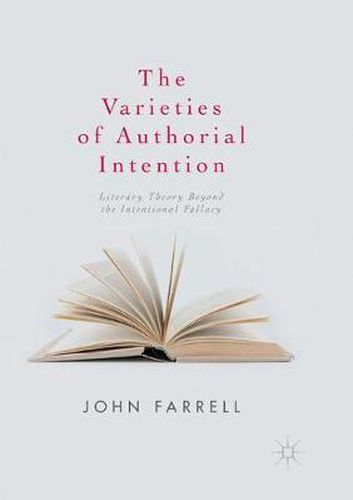Readings Newsletter
Become a Readings Member to make your shopping experience even easier.
Sign in or sign up for free!
You’re not far away from qualifying for FREE standard shipping within Australia
You’ve qualified for FREE standard shipping within Australia
The cart is loading…






This title is printed to order. This book may have been self-published. If so, we cannot guarantee the quality of the content. In the main most books will have gone through the editing process however some may not. We therefore suggest that you be aware of this before ordering this book. If in doubt check either the author or publisher’s details as we are unable to accept any returns unless they are faulty. Please contact us if you have any questions.
This book explores the logic and historical origins of a strange taboo that has haunted literary critics since the 1940s, keeping them from referring to the intentions of authors without apology. The taboo was enforced by a seminal article, The Intentional Fallacy, and it deepened during the era of poststructuralist theory. Even now, when the vocabulary of critique that has dominated the literary field is under sweeping revision, the matter of authorial intention has yet to be reconsidered. This work explains how The Intentional Fallacy confused different kinds of authorial intentions and how literary critics can benefit from a more up-to-date understanding of intentionality in language. The result is a challenging inventory of the resources of literary theory, including implied readers, poetic speakers, omniscient narrators, interpretive communities, linguistic indeterminacy, unconscious meaning, literary value, and the nature of literature itself.
$9.00 standard shipping within Australia
FREE standard shipping within Australia for orders over $100.00
Express & International shipping calculated at checkout
Stock availability can be subject to change without notice. We recommend calling the shop or contacting our online team to check availability of low stock items. Please see our Shopping Online page for more details.
This title is printed to order. This book may have been self-published. If so, we cannot guarantee the quality of the content. In the main most books will have gone through the editing process however some may not. We therefore suggest that you be aware of this before ordering this book. If in doubt check either the author or publisher’s details as we are unable to accept any returns unless they are faulty. Please contact us if you have any questions.
This book explores the logic and historical origins of a strange taboo that has haunted literary critics since the 1940s, keeping them from referring to the intentions of authors without apology. The taboo was enforced by a seminal article, The Intentional Fallacy, and it deepened during the era of poststructuralist theory. Even now, when the vocabulary of critique that has dominated the literary field is under sweeping revision, the matter of authorial intention has yet to be reconsidered. This work explains how The Intentional Fallacy confused different kinds of authorial intentions and how literary critics can benefit from a more up-to-date understanding of intentionality in language. The result is a challenging inventory of the resources of literary theory, including implied readers, poetic speakers, omniscient narrators, interpretive communities, linguistic indeterminacy, unconscious meaning, literary value, and the nature of literature itself.